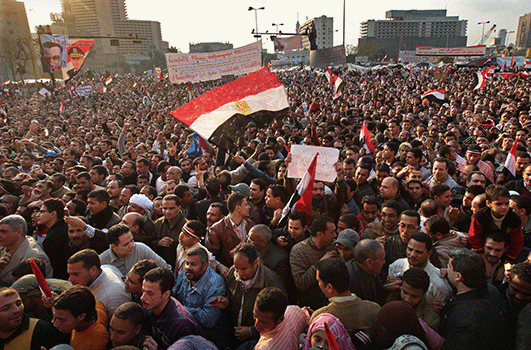Historic Presidential Election in Egypt
May 23, 2012
Heavy turnout marked the first of two days of voting in Egypt‘s first free presidential election. The election is also the first competitive presidential election in the Arab world. Thirteen candidates were vying for the right to become Egypt’s first democratically elected leader following the 2011 overthrow of President Hosni Mubarak, who ruled Egypt as a dictator for nearly 30 years. Mubarak was swept from office by massive public demonstrations during a period of protest and political unrest in several Middle Eastern countries that was referred to as the “Arab Spring.” Mubarak routinely stood for election, often winning an overwhelming share of the vote, but the elections were widely considered as shams by independent observers.
The presidential candidates include both Islamists (who favor a government based on Islamic law) and secularists (who favor the separation of government and religion). Some of the candidates served under Mubarak. If none of the candidates captures 50 percent of the vote, the top two winners will face each other in a runoff in mid-June. The presidential election followed a three-week campaign that included Egypt’s first American-style television debate. Chief among the issues in the race was the increase in lawlessness and crime since the abolition of Mubarak’s police state.

Hundreds of thousands of Egyptians protest against the government of President Hosni Mubarak in January 2011. The sometimes violent demonstrations led to Mubarak’s resignation in February. (© John Moore, Getty Images)
The Supreme Council of the Armed Forces, the military dictatorship that took control of the government after Mukarak’s ouster, has promised to hand over power after the election of a new president and the ratification of a new constitution. However, many Egyptians remain suspicious of the military, which has muzzled opposition to its rule and controls a sizeable portion of the country’s economy. In April, an administrative court suspended a committee appointed to draft a new constitution. Military officials have also indicated their unwillingness to submit to full civilian rule.
Egypt held elections for its new parliament in late 2011 and 2012. Islamist parties won an overwhelming majority of seats in the People’s Assembly, the lower house. The Freedom and Justice Party, the political wing of the Muslim Brotherhood, took approximately 40 percent of the seats, and the ultraconservative Salafist Nour Party won 21 percent.
Additional articles in World Book:
- Tahrir Square
- Egypt 1922 (a Back in Time article)
- Egypt 1981 (a Back in Time article)
- Egypt 2011 (a Back in Time article)
- The Middle East: From Fall to Spring (a Special Report)


